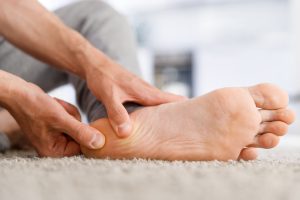 Severe heel pain and discomfort could mean you have plantar fasciitis. Our podiatrists, Eric Kuhlman, DPM, AACFAS and Varun Chopra, DPM, here at CSO can help evaluate your pain and work with you to find relief. They are currently scheduling new patients and can book same and next day appointments! Continue reading to learn more about plantar fasciitis and contact us to set up your appointment today!
Severe heel pain and discomfort could mean you have plantar fasciitis. Our podiatrists, Eric Kuhlman, DPM, AACFAS and Varun Chopra, DPM, here at CSO can help evaluate your pain and work with you to find relief. They are currently scheduling new patients and can book same and next day appointments! Continue reading to learn more about plantar fasciitis and contact us to set up your appointment today!
If you’re experiencing severe pain or any type of discomfort in the bottom of your heel, chances are you might be suffering from plantar fasciitis. So, what exactly is plantar fasciitis?
Plantar fasciitis is basically an orthopedic condition that causes pain and discomfort in the bottom of the heel. It’s a common issue that leads to inflammation of the plantar fascia (a tissue in the foot that’s commonly used during all kinds of foot movement).
Although the pain might change depending on what activity you’re doing, some common types of pain associated with this condition include a constant ache in the heels, pain when you stand after sitting down or sleeping, sharp pain when you put pressure on your heels, etc.
Major causes of plantar fasciitis
The condition can be caused by several factors. The major ones include heel spurs, overuse of muscles, uncomfortable shoes, too much pressure on the foot structure, and so on. Overstretching and overuse of the ligament can also cause this pain.
Performing repetitive movements with the affected leg, running or exercising on a hard surface, and exercising without warming up are some other causes of plantar fasciitis.
What are the major symptoms?
The most common symptoms include the following:
- Heel pain
- Stiffness and pain in the arch of your foot
- Stiff Achilles tendon
- Swelling around the heel and ankle
Risk factors
While plantar fasciitis can develop without any cause, some factors can certainly increase your chances of developing this health condition. They include:
- Age
- Overweight or obesity
- Specific types of exercises
- Jobs that keep you on your feet for long durations
What are the treatments?
This orthopedic condition can be treated with home remedies, non-surgical, and surgical treatments.
Home treatments
Home treatments such as icing, rest, and anti-inflammatory medicines are some of the best home remedies to treat Plantar fasciitis. Applying ice to the affected heel 3-5 times per day and resting can help reduce swelling and ease the pain.
Replacing uncomfortable and worn-out shoes and using arch support can also help alleviate the discomfort. Non-steroidal anti-inflammatory medicines and applying essential oils to the affected area may help too.
Non-surgical treatment
Non-surgical treatments include physical therapy, shock wave therapy, and specific stretching exercises.
Physical therapy is one of the most important parts of treatment for this condition. The therapy can stretch the Achilles tendon and plantar fascia and help strengthen the lower leg muscles.
If the therapy doesn’t work, your physical therapist might recommend extracorporeal shock wave therapy that can regulate pain and discomfort. While shock wave therapy is beneficial, it’s important to note that it comes with certain side effects, including numbness, swelling, and bruises.
Stretching exercises, meanwhile can also help ease and prevent plantar fasciitis. Gently stretching the plantar fascia and calves can help reduce heel pain and also alleviate stiffness in the muscles.
Surgical treatment
Surgical treatment is also an option, but it’s only performed in cases where the pain is really severe, or the condition lasts for more than six months.
Wrapping up
While it’s a common condition that can be treated through home remedies, therapies, and other medical treatments, it’s important to note that the treatment can take a few months to ease the symptoms. If left untreated, though, the condition can become more severe and complicated.
Original article published on sportskeeda.com







